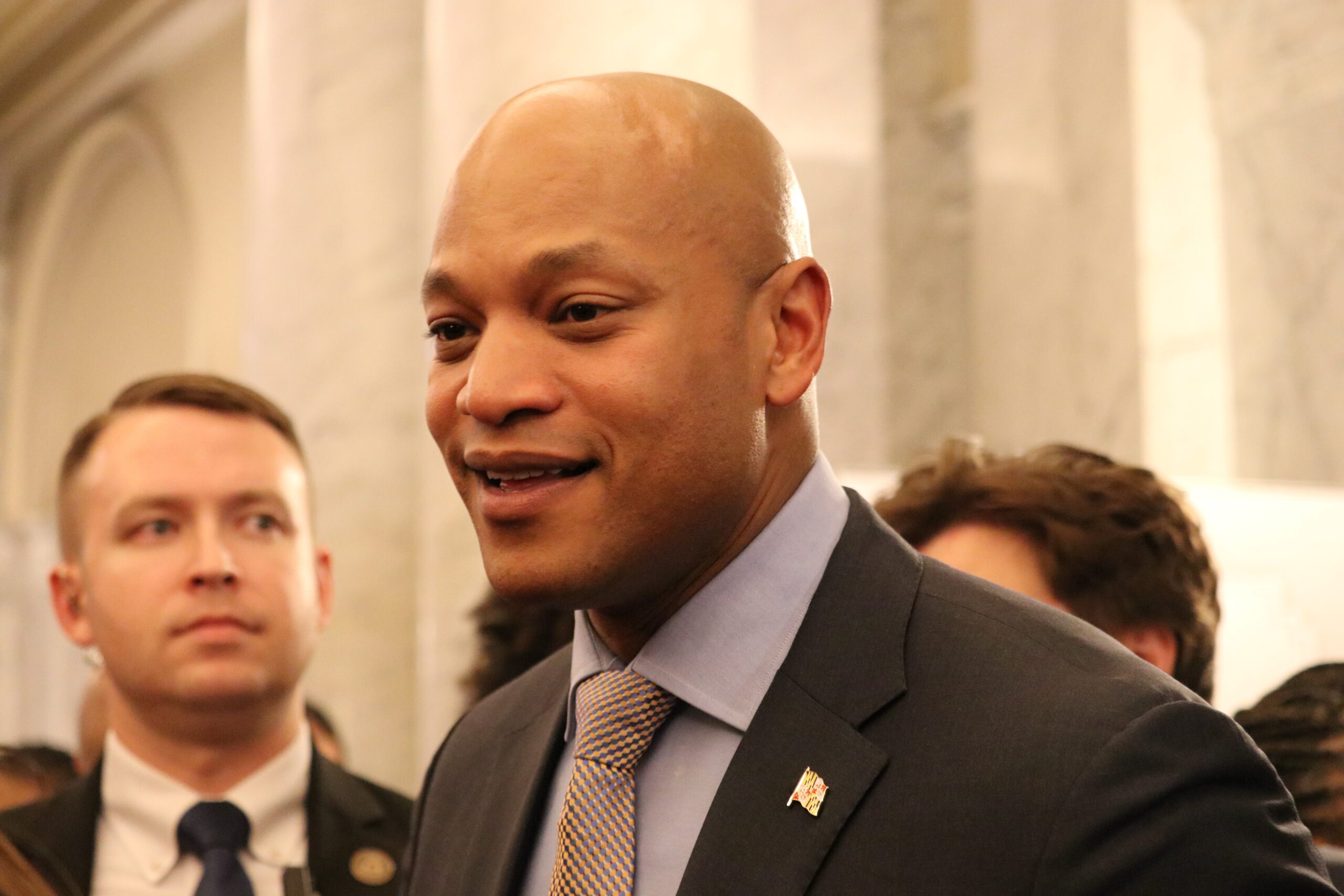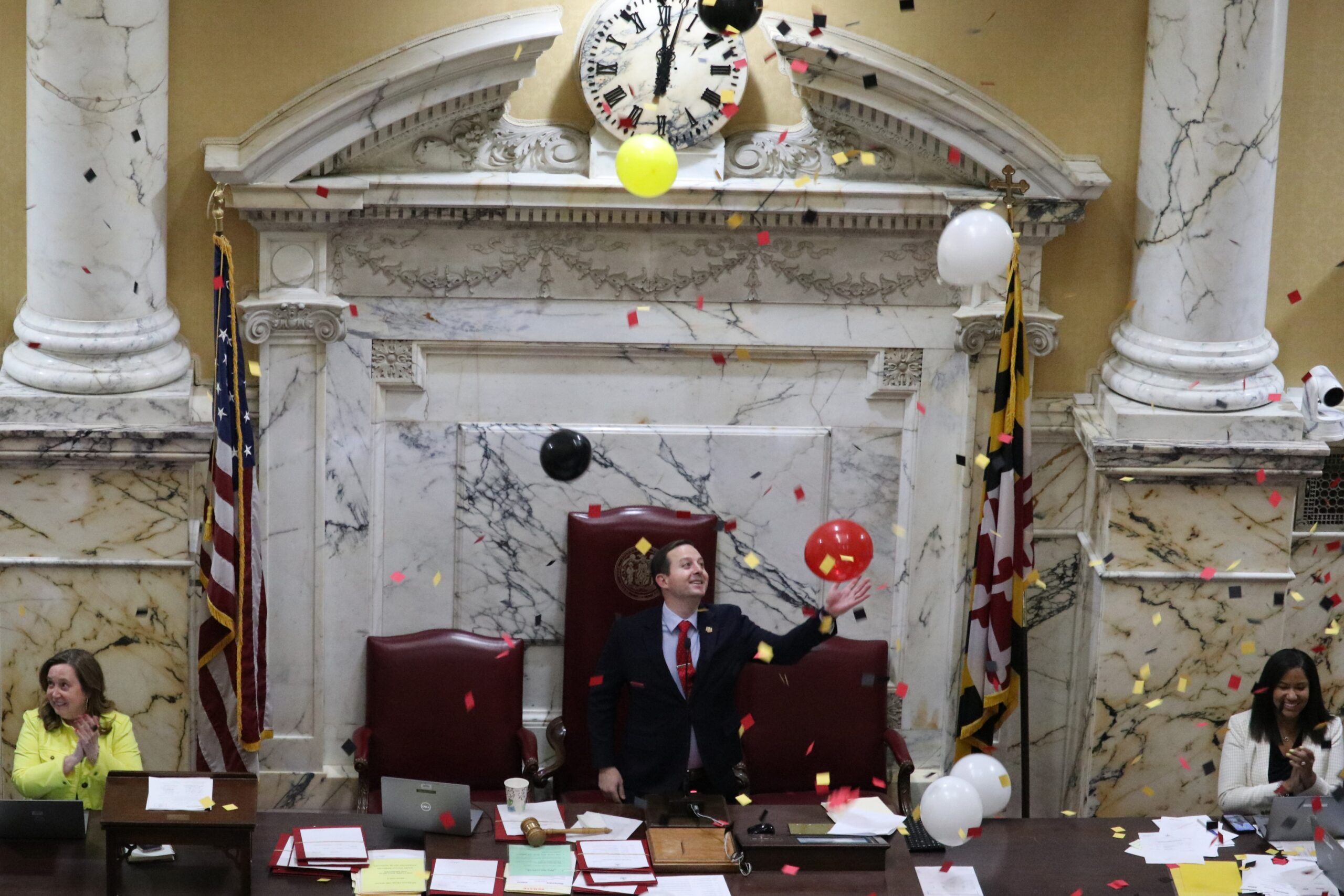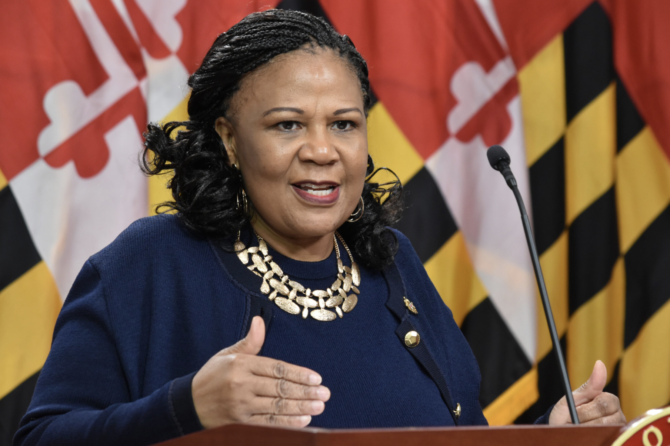MARYLAND MATTERS: An angry Republican walk-off in the House of Delegates and a photo finish in the Senate ended the 2023 session of the Maryland General Assembly on Monday night.

Gov. Wes Moore (D) greeted lawmakers and revelers early Tuesday morning after the Maryland General Assembly adjourned its 90-day session. Photo by Danielle E. Gaines.
As both chambers adjourned sine die, the legislature’s teenage pages dumped boxes of confetti and trash bags full of balloons from the galleries above onto the rostrums and floors of the Senate and House, sending flashes of color raining down on the president and speaker below, in the traditional celebratory close.
When all was said and done, legislative leaders in the Democratically controlled houses, along with the state’s new governor, declared victory, taking bows for an exceptional session and ignoring their stumbles and defeats.
“It’s not only the most successful first session for any new governor… [but] we’d argue that it’s the most successful … session for a governor, period,” enthused Gov. Wes Moore (D), at an afternoon press conference with fewer than eight hours left to go.
Moore did caution that, “nothing’s done until it’s done.”
And there was indeed plenty more to do, this last day.
In the end, lawmakers approved the regulatory framework for the sale of recreational cannabis when it becomes legal July 1, passed more restrictive handgun laws over multiple attempts by Republicans to water down the proposals, established a new state authority to oversee thoroughbred horse racing, and expanded the size of the Maryland Stadium Authority board to 11, to include a seat for Prince George’s County.
Before the final day, the legislature already had approved putting a Constitutional amendment championed by House Speaker Adrienne A. Jones (D-Baltimore County) on next year’s ballot to enshrine abortion rights and lifted legal limitations on when survivors of child sexual abuse are able to bring suit against their alleged abusers.
“Some issues didn’t make it across … but that’s expected, and it’s a four-year term and so we’ll be back nine months from now to take it up again.” Senate President Bill Ferguson (D-Baltimore City) said.
Among the bills that did make it across were measures to expand and modernize the offices of Comptroller Brooke Lierman (D) and Anthony Brown (D), who took office in January. Legislation passed to create a new Taxpayer Advocate Division for the comptroller, and for the attorney general, a new environmental and natural resources crime unit and new powers to enforce civil rights laws.
Treasurer Dereck E. Davis’s office will take over management of the state’s beleaguered Maryland 529 college savings program.
The General Assembly passed a $63 billion budget for the upcoming Fiscal Year 2024, which begins July 1, nearly $1 billion less than Hogan’s spending plan last year. That dollar figure included $5.1 billion for projects in the capital budget.
Unlike years past, when lawmakers could only decrease budget items, this was the first year in more than 100 that the legislature was empowered to increase, decrease and move money around the governor’s proposed budget, as per a measure approved by voters in 2020.
The final budget included $900 million to the Blueprint for Maryland’s Future fund, the state’s savings account for an ongoing ten-year education reform effort.
The budget maintained $2.85 billion in cash reserves, down from $5.2 billion before the legislative session began. The new reserves include $2.5 billion in the so-called Rainy Day Fund (Revenue Stabilization Account) and $351 million in the state’s general fund.
Throughout the day Monday, lobbyists set up grills around State Circle and side streets, offering food and drink to all comers on what was a beautiful spring day under a cloudless blue sky.
The book is now closed on the 445th meeting of the General Assembly, the first session of a four-year term that began Jan. 11 — a week before Moore was inaugurated, and the State House was returned to the full control of Democrats after eight years under Gov. Larry Hogan (R). The Senate and House had remained solidly Democratic throughout.
Early Monday in the Senate, Republicans made an effort to resurrect their criminal justice bills — drawing out a discussion on the Maryland Sustainable Buildings Act of 2023, which, among other changes, would update standards for state building construction to conserve energy and minimize impact on birds.
“It’s frustrating to have sat here for 90 days — and we’ve really been having a frank discussion about the loss of life in this state to violent crime, we’ve had a discussion about other sort of major environmental catastrophes — and … a bird-safe bill is coming out on the floor here when we still haven’t dealt with the issue of repeat violent offenders. It’s troubling to me the priorities that we see,” said Sen. Justin D. Ready (R-Carroll and Frederick), the minority whip.
None of the measures moved forward in the legislature’s final hours.
Lawmakers introduced nearly 2,300 pieces of legislation — 979 in the Senate, 1305 in the House — in the first full session since the COVID-19 pandemic all but turned the State House into a virtual meeting place in March 2020.
The 2023 session was marked by dramatic change.
Moore became Maryland’s first Black governor Jan. 18, and his running mate, Aruna Miller (D), the first Indian-American lieutenant governor, as the state’s political hierarchy looked on that brisk afternoon three months ago on State Circle.
Having never held public office before, Moore faced a sharp learning curve on the ways of governing Maryland.
His staff-generated schedule, supplied daily to the press, noted this for Monday:
“11:59 PM: Governor Moore will ring the ceremonial bell to celebrate Sine Die 2023.”
There is no ceremonial sine die bell that the governor, or anyone else, rings.
Early in the evening Monday, the governor did visit both the Senate and House of Delegates to thank members for their efforts.
Throughout his term, Moore has been focused on a better working relationship with the legislature, to include regular meetings in the State House and over breakfast at Government House, the governor’s mansion.
“Even I have been surprised by the number of people that have come into Government House or come into the governor’s office and said, ‘I’ve never been here or I haven’t been here in eight years,’” said Eric G. Luedtke, the former House majority leader who left the legislature to become the governor’s chief legislative officer. “And not just Democrats, Republicans too.”
Since November, when the current members of the General Assembly were elected, two senators and six delegates have either left or will be shortly leaving their respective chambers.
The Moore administration resurrected other norms in their first year in office.
In February, Moore personally appeared at a hearing for his bill to give military retirees a larger tax break — the first time a governor had done so since the administration of Gov. Martin J. O’Malley. (The General Assembly ultimately passed the legislation with amendments to increase the state’s current tax credit but limit the maximum subtraction modification to $20,000, half of what was sought by the governor.)
Lt. Gov. Miller, along with Moore’s cabinet secretaries, also appeared to advocate for or respond to legislation in committees.
“The feedback I’m getting from legislators is more about their day-to-day work, like having agencies actually respond to questions, and secretaries give them calls about issues,” Luedtke said. “And I think that relationship has been completely reset by this session. Part of it is we wanted to reset it, and part of it is the legislature wanted to reset it, too.”

Senate President Bill Ferguson (D-Baltimore City) watches as confetti falls over the chamber at the close of the 2023 legislative session. Photo by Danielle E. Gaines.
Moore did deliver on a campaign promise to make his administration the most diverse in state history, appointing a number of women, Black and Latino officials to the state government’s top spots.
His first 83 days in office met with occasionally mixed, but generally favorable, results.
Ferguson said the Senate approved “99.9 percent” of Moore’s appointments, under its charge for advice and consent.
Moore’s appointment of Yolanda Maria Martinez to the Stadium Authority board was held by the Senate Executive Nominations Committee after Maryland Matters reported she had a troubled 35-year financial history that included a recent $7.2 million bankruptcy and dozens of lawsuits and judgments for bad debts filed against her.
The governor, his staff and Martinez supporters pressured the Senate — both publicly and behind the scenes — to approve the Ellicott City businesswoman’s nomination, but the committee did not budge. The nomination quietly died in the chairwoman’s bottom desk drawer.
One of Moore’s picks for the Public Service Commission, Juan Alvarado, a gas industry official, withdrew his nomination, after a public backlash largely because of his employment in the gas industry at a time when state leaders are trying to move policy away from fossil fuels.
Moore’s nominee for superintendent of the Maryland State Police, former Lt. Col. Roland L. Butler Jr., faced stiff opposition from some in the Senate, but was able to overcome the objections and be confirmed.
Legislative leaders and the Moore administration also made it a point this session to “rebuild state government,” which had a 13% vacancy rate at the end of the Hogan era.
“It’s gonna take us some time to build out a state government that is more attractive to employees, but it’s something we’re already making a lot of progress on, I think,” Luedtke said.
There were non-legislative diversions and distractions throughout the session, including the attorney general’s release of a report on child sexual abuse by Roman Catholic clergy over the last 80 years and Linda H. Lamone’s announcement of her retirement as the State Board of Elections administrator after more than 25 years.
Moore, along with Ferguson and Jones, will take part in a bill-signing ceremony at 12 noon Tuesday. Among the bills to be signed are:
- Fair Wage Act of 2023, which accelerates an increase in the state’s minimum wage from the current $13.25 an hour to $15 an hour beginning Jan. 1, 2024, a year before what had been approved in 2019.
- Child Victims Act of 2023, which lifts time limitations on alleged victims of child sexual abuse to sue for damages.
- Family Prosperity Act of 2023, which permanently extends the 2021 expansions of the Maryland earned income credit, beginning June 1. The earned income credit offers both refundable and nonrefundable credits against the state income tax and a nonrefundable credit against the local income tax for low-to-moderate-income resident taxpayers.
Photo: Confetti falls on House Speaker Adrienne A. Jones (D-Baltimore County) as the curtain drops on the 2023 legislative session. Photo by Bryan P. Sears.










